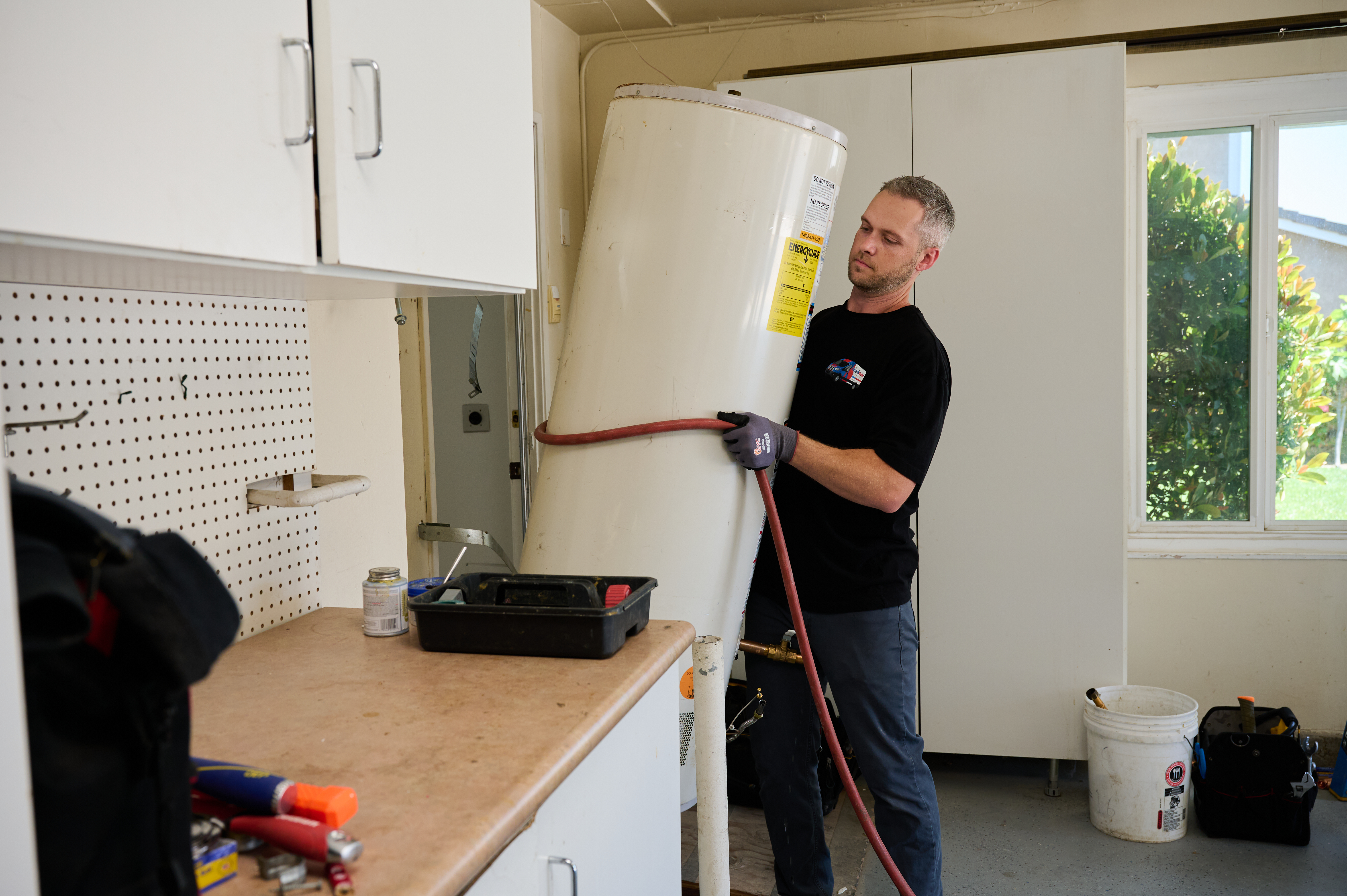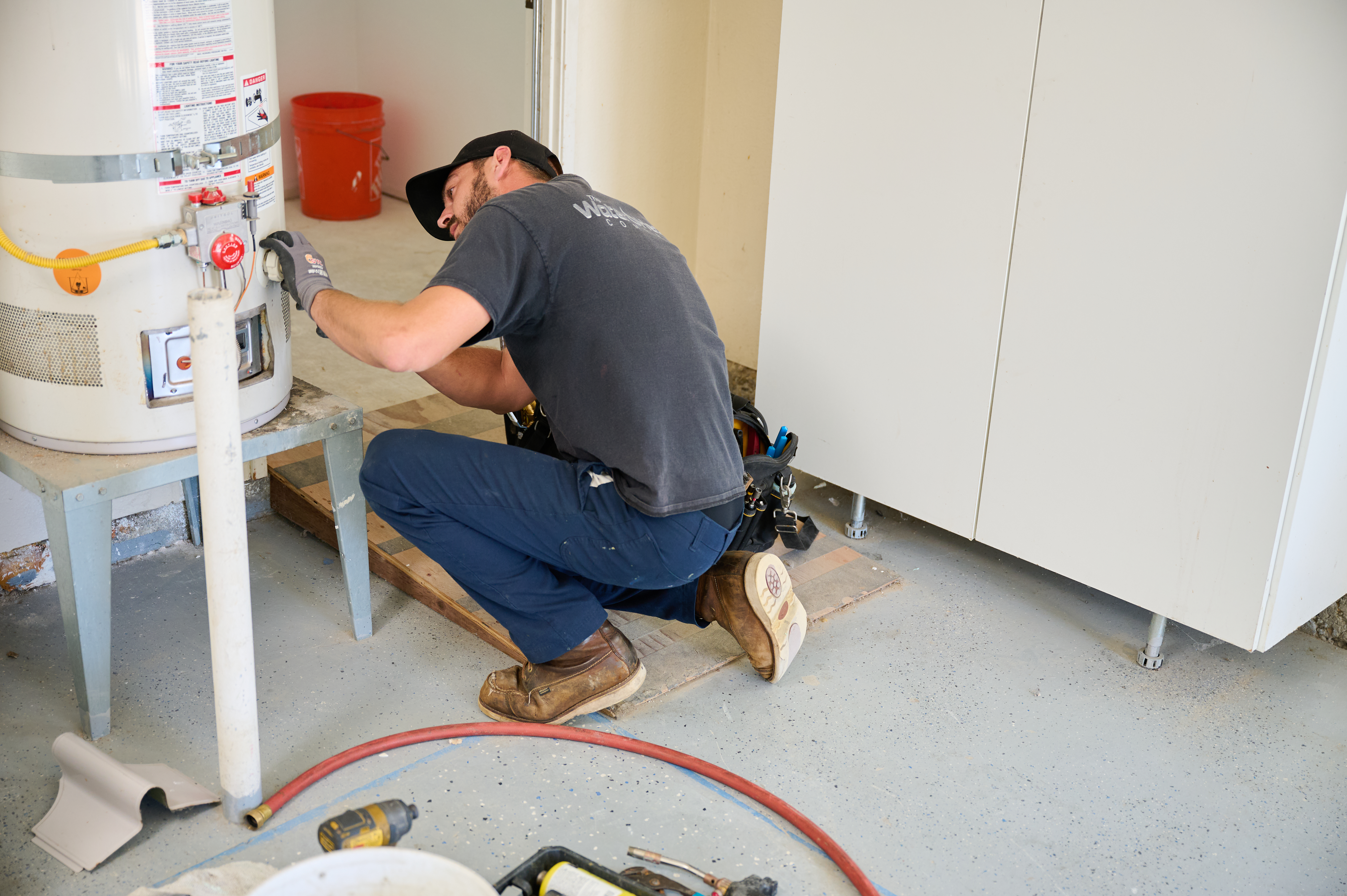
Looking to replace or upgrade your water heater? Use this water heater replacement cost guide to see what the work will cost and what factors affect your total.
Bring the heat with a few simple fixes


Sediment buildup is a common cause of a pilot light on but no hot water.
A rusty thermocouple can also cause your water heater not to yield the right water temperatures.
Another cause includes a tripped breaker or blown fuse.
Contacting a plumber near you is the safest way to troubleshoot a faulty water heater.
Ice-cold showers are anything but pleasant, so if you can’t get any warm water, you’ll want to get to the solution quickly. However, if your water heater won't turn on even though your pilot light is on, this could leave you scratching your head.
If the pilot light is on, but there’s no hot water several potential culprits are at play. Let's cover how to diagnose a water-heater burner not lighting to avoid a water heater catastrophe in your home.
We highly recommend inspecting your water heater annually for signs of degradation. If you spot any potential warning signs, consider contacting a local plumber.

Start with a visual assessment of your water heater components. If you think that the burner isn't on because you can't hear the familiar sound, remove your cover plate to confirm that you can't see the burner firing.
Once you confirm that you're not getting a light, move to your temperature dial. Here's how you want to troubleshoot:
Turn the dial to "vacation" or "low"
Go back up to your desired temperature
Check for a light
But what if that doesn't do the trick?
Let's bring it up a notch. This time, start by switching to "vacation" or "low" mode. The difference is that you're now going to go up 10 degrees to 20 degrees higher than your desired temperature. You might just see the light kick on.
This trick often works because thermostats will lose accuracy through something called "drifting" as they get older. Just make sure you're not letting your water get too hot when you use this trick. Faucet temperatures of 120 to 140 degrees Fahrenheit are considered safe for avoiding scalding. If you have children or elderly family members living in your home, scale that down to 120.
If the dial trick doesn't work, you could have a sediment issue. Sediment accumulation at the bottom of a tank can easily cause your thermostat to malfunction. The sediment buildup acts as insulation that causes your thermostat to reach the indicated temperature before your water does.
This accumulation is a common cause behind warm water that never fully heats up. Signs of sediment accumulation include popping or banging noises, as well as dirty-looking or bad-smelling water. If you see any of these signs, it’s time to call a pro.
Your thermocouple is the sensor that measures temperature. You can check for a few things on the thermocouple before calling a plumber to help you with a replacement. However, if you don't want to deal with fiddling around with the thermocouple, then a plumber may be your best option. With this in mind, here’s what to check for before you call in the pros.
Rust is a common cause of thermocouple dysfunction. Here's how to troubleshoot a suspected rust issue on a thermocouple:
Turn off the gas valve to the pilot.
Remove the cover plate.
Check to see if the thermocouple is buried in rust.
Most people prefer to hire a local plumber at this point to service the thermocouple. But if you know what you’re doing, you can attempt to brush or vacuum the burner element and pilot area. Just make sure you're letting everything cool completely before touching parts.
Using a shop vacuum over a household vacuum is preferred. You'll need to dump out the debris in a fire-safe way that includes leaving the vacuum and filter to ventilate for at least 12 hours.
You also have to be careful about not breaking off the pilot or gas fittings when cleaning the rust.
If rust isn't the issue, check that the sensor is properly immersed in the pilot flame. The thermocouple may have slipped out of place. If the thermocouple isn't sensing enough heat, it prevents the gas control valve of the main burner from opening.
If none of those troubleshooting points work, replacing your thermocouple is the last option. Thermocouples cost between $10 and $20. Most plumbers charge between $75 and $150 for labor on this type of job.
If the options above don’t restore your much-needed hot water, consider the less common reasons why the hot water isn’t working, such as:
Power malfunction: If you have an electric hot water heater, check to see if it’s still connected to power. Locate your breaker box or electrical panel and look for any flipped switches or blown fuses.
Bad thermostat: Both gas and electric water heaters have a thermostat that regulates the water temperature. Check if the temperature looks correct (between 120 to 140 degrees). If the temperature isn’t right then you may need to replace the thermostat.
Gas leak: If you have a gas water heater and you hear a hissing sound, then you could have a gas leak on your hands. If you suspect this, you need to call your gas provider right away, and they can come out and confirm the presence of a leak and perform any necessary repairs.
Many people don't want to troubleshoot a burner because it can be dangerous. Not only could you damage your water heater if you do something wrong, but true to its name, it can be hot to the touch.
While it never hurts to check for the obvious fixes, you should avoid touching components of the heater if you don't have expertise in that area. Most local gas plumbers can diagnose the issue within a few minutes to give you an answer about whether you're looking at a simple fix, a sign your water heater is about to fail, or anything else in between.
The average cost to repair a water heater falls between $225 and $975, with most plumbers charging between $45 and $200 per hour.
Keeping your water heater problem-free starts with proper maintenance—and what better way to stay on top of your unit than to have a reputable local plumber on call to save the day? With this in mind, you’ll want to vet at least three prospective plumbers thoroughly before deciding on a plumbing company. Here are some questions you can ask before you decide on a pro.
Is there anything I can do by myself to resolve the issue?
How many years of experience do you have?
Do you have licensing?
Are you insured?
What type of water heater are you most experienced in repairing?
Does your company offer workmanship warranties or satisfaction guarantees?
What’s your estimate for repairing my water heater?
What does the payment plan look like?
How long does it take to repair a water heater with no hot water?
Is there anything I need to do before you arrive to repair my unit?
How do you handle dispute resolutions?
Great customer service and reasonable price. I do not get water in my basement now. So happy.
Brian, James, and Sean worked well together. They called two hours before arriving and gave the time of arrival. The older home needed needed special care and they did a wonderful job on the plumbing, water lines, and carpentry work on all walls. Very professional results! We appreciate West...
Nice guys. They came, loaded up and left. It was fast and efficient.
On May 11, 2020 Mr. Stephen Wesson came to my home to service my Viking refrigerator. He ordered a compressor and a board. I paid him $2,500.00 in cash for the parts. He returned about a week later and was here about 20 minutes. I was outside while he was working. When I came in, he was...
Very professional from the phone call all the way through the service provided. Our pressure switch went out on our pump late Saturday nite (no water) and they sent Michael out he and Cory replaced it and made sure everything was working!! Very friendly knowledgeable and professional. We...
Did a excellent job and were great at communicating to me what was going on
Provided additional information @ incoming water pressure and Water Heater tips that I was not aware of and made necessary repairs. I was an observer and questioner for the complete repair job and they were professional in approach and service. I would hire them again when I need them.
Mike was very prompt and courteous. I explained the problem of my toilet whistling when water ran in other parts of the house and on its own out of the blue. He tested a few things. Then replaced the fill valve. He was in and out in 20 minutes. I appreciate the quick follow-up through...
Bobby Monk, the owner and home inspector, performed a home inspection for me in Hoover, AL on a 1960's home. As soon as I moved into the house, there were major plumbing issues. The water in the shower drained very slowly the first time I took a shower. And, then when I flushed the toilet,...
I called Ron to help me with a leaking water heater. Unfortunately he is not licensed to practice in Shelby County and that is where I live. However..he told me how much a new water heater should cost, labor and all and what kind to ask for. I sure wish he could have come here.
From average costs to expert advice, get all the answers you need to get your job done.

Looking to replace or upgrade your water heater? Use this water heater replacement cost guide to see what the work will cost and what factors affect your total.

Tankless water heater costs depend on the size of your water heater, location, fuel type, and more. Keep reading to calculate your expenses.

While solar water heater costs are a bit higher than a standard system, this energy-saving option could pay for itself in a few years. Here’s what you need to know.

When your hot water is not working, it’s not always a water heater issues. Find out the cause and how to correct the course in our guide.

If your water heater isn't heating up properly, you could have a drainage issue. These common causes of water heater not draining could be to blame.

Explore the features, capacity, price, and efficiency of the most common types of water heaters to help you find the right one for your home.